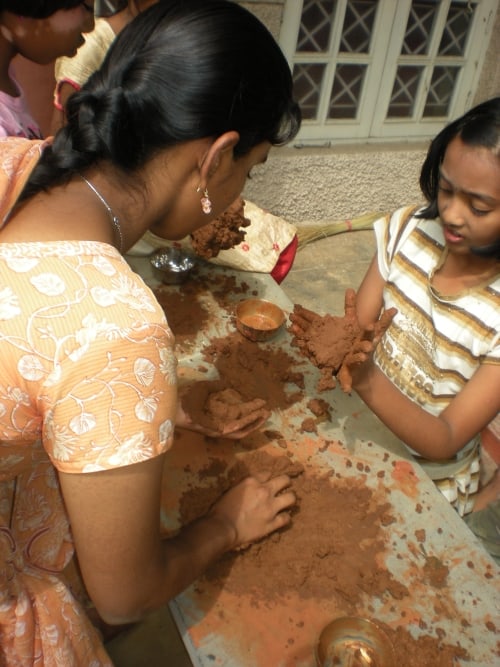It only took 13-year-old Aditya’s bragging about how quick and efficient he was at the newly acquired skill of tying flowers, for the girls in his group to take it upon themselves to beat him at his game. What started as a fun contest, turned into a fierce battle with each camp pelting flowers at each other. Your reporter, lips pursed in concentration, attempting to learn to tie flowers from ten-year-olds, was caught in the crossfire.

A participant at the workshop making a Ganesha idol using clay. Pic: Siri Srinivas
This was the workshop organised by the Environment Support Group(ESG) for children on making Ganesha idols on Sunday September 5th, at their Banshankari office. It was a day-long workshop for children aged 8 to 15 on the upcoming festival. ESG, a non-governmental, not-for-profit organisation that works for environmental causes organised the workshop to sensitise young people to the impact of festivals and irresponsible wastage on the environment, while also to re-introduce them to traditional practices which, they believe, were organic and environment-friendly in the first place.
The workshop started with a discussion on the significance of festivals and the manner in which they are celebrated by different religions. The children were then also told about the environmental impact of the wastage that a major festival such as Ganesh Chaturthi entails. "They seem to be aware of the pollution that irresponsible practices result in", the organisers say.
After this, discussions were held on festivals and the scientific ideas behind the rituals followed. The young participants then indulged in a fun session of drawing rangolis and made festoons with mango leaves, that are mandatory for most Hindu festivals. The noisy bunch then moved to the kitchen and excitedly made kadubus with the help of patient women who had volunteered to help. Lunch was, quite literally, a sit down affair with the tired participants feasting on traditional fare (including the yummy kadubus they’d helped make) on plantain leaves.
The most important activity of the day was learning to make clay Ganeshas, a practice that was the norm until cheap, colorful (and containing harmful paints) Ganesha idols sold in makeshift markets gained popularity. "The objective of the workshop is mainly to attempt to revive our traditional, sustainable practices", says Bhargavi S Rao, co-ordinator, Educational Programs, ESG.

The children were also taught to make mango thoranas. Pic: Siri Srinivas
Bhargavi believes that it is important to teach the current generation about the scientific logic behind traditional practices. She relates how she learned about the anti-septic properties of cow-dung, traditionally used to clean porches, from a veterinary biologist during a research stint. "Our generation didn’t have access to the science behind most traditional practices and we’re trying to change that for the children of today by focusing on reasoning. For instance, we spent time discussing the medicinal properties of mango leaves." she says, explaining the mango thoranas.
The twenty-odd participants then split into groups of four to play chowka-bara – a traditional game played with curios used as pawns and seashells rolled as dice. I was surprised to know that this lot, hooked by admission, to computer games, were enthusiastic about this humble Indian substitute to board games.
It’s all very well to conduct day-long workshops, but how do you impress upon children the importance of green and organic ideas? Bhargavi disagrees that this will remain a token demonstration; she says that this workshop is really an attempt to stimulate their imagination and encourage them to find newer, greener methods. Besides being about environmentally-safe methods, it was also an attempt to go back to the simple, traditional nature of festivals being occasions to celebrate and bond with family. "Festivals have become such consumerist affairs. Parents must, most of all, inculcate simplicity into young minds"

The participants of the workshop also enjoyed playing traditional board games. Pic: Siri Srinivas
Most of ESG’s educational activities have been designed for teachers of subjects related to Environmental Sciences. This workshop for children was a step in a new direction for ESG. "People know us most for our protests and litigations. This is one of our quieter projects", jokes Bhargavi. Founded in 1996, ESG works on a number of campaigns for environmental causes. Speaking on fundamental environmental concerns like waste-disposal, Bhargavi explains that recycling waste is quite an ambitious idea for India. "Considering the nature of waste households in urban areas generate, achieving effective segregation is a far more realistic idea", she says.
It is pleasantly surprising to see that today’s children are very aware of their responsibility towards the environment. What is equally pleasing is their buoyant excitement for festivals and the culture that is theirs. Perhaps now, adults can follow their lead on both counts this Ganesha Chaturthi.
⊕